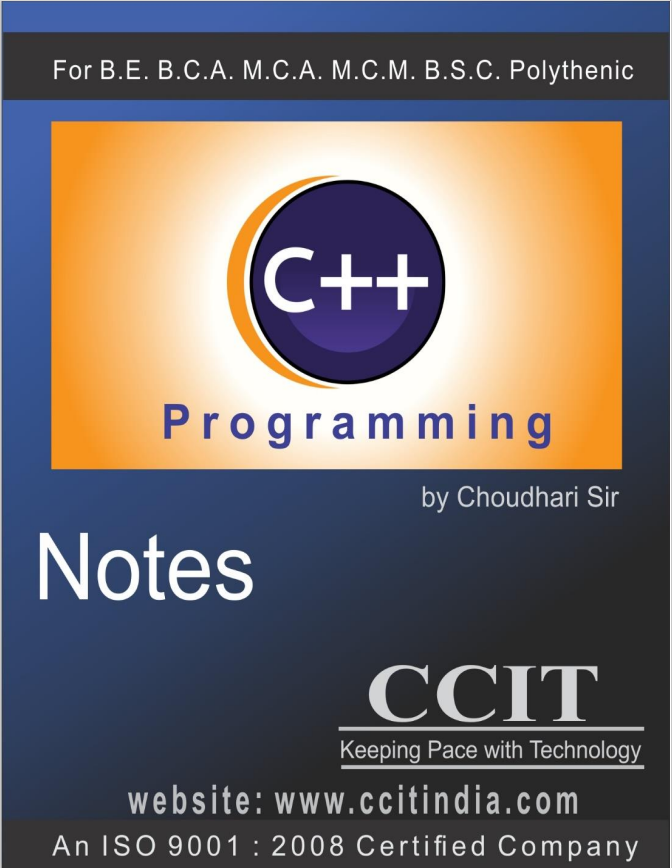C++ Programming
Mastering C++ offers efficiency, versatility, and a powerful foundation. Learn for high-performance software development, system programming, and game development, securing a wide range of career opportunities.
Duration | 3 Months

Course Objective
Gain a comprehensive understanding of C++ programming. Master object-oriented principles, data structures, and algorithms. Develop skills for robust software engineering, system-level programming, and efficient application development through hands-on projects.

Key Features
Duration : 3 Months
Theory Lectures : 86
Practical Lectures : 82
Theory Notes : 
Certificate : 
Project : 
Thing You will Learn
1. Introduction
- Concepts of Object-Oriented Programming
- Benefits of OOP
- What is C++
- Structure of C++ Program
- History of C++
- Executing a C++ Program
2. IDEs
- Turbo C++
- Dev C++
- Code Block
- Visual Studio Code
3. Variables, and Data Types
- Tokens
- Keywords & Identifiers
- Data Types
- Variable Declaration
- Assign Variable value
4. Operators & Expressions
- Arithmetic Operators
- Relational Operators
- Logical Operators
- Assignment Operators
- Increment and Decrement Operators
- Ternary Operator
- Arithmetic Expressions
- Precedence of Operators
- Mixed Expressions
- Type casting
- Scope Resolution Operator
- Member Dereferencing Operators
- Memory Management Operators
5. Decision Making
- Decision Making Statements
- Boolean Expression
- If Statement
- Nesting of If…Else
- Ladder Structure
- Switch Statements
6. Iterative statements
- While Loop
- Do…While Loop
- For Loop
- Nesting of Loops
- Break statement
- Continue Statement
- goto Statement
7. Functions
- Defining Functions
- Function Declaration
- Categories of Functions
- Types of Functions
- Built-in function
- User-Define Function
- Function with Arguments
- Function returning
- Recursive Functions
- Function Prototype
- Pass by Reference
- Pass by Reference
8. Array
- Introduction to Array
- Accessing Array element
- Array Initialization
- One Dimensional Array
- Multi-Dimensional Array
- Array of Object
9. String
- String Declaring
- Initializing String Variables
- Reading and Writing Strings
- String Processing
- Char Functions
- String Handling Functions
10. Object Oriented Programming
- Introduction to OOP
- Data Abstraction
- Data Encapsulation
- Specifying a Class
- Data Member
- Member function
- Object creation
- Object Member Accessing
- Access Specifiers
- Setter Methods
- Member Function Returning value
- Nesting of Methods
- Member Function Overloading
- Mutable Object
- Mutable methods
- Static Data Member
- Accessing Static Member
- Static Member Function
- Inline Function
- Passing object as argument
- Object as reference argument
- Returning object
- Friend Function
11. Constructors and Destructors
- Introduction Constructors
- Parameterized Constructors
- Multiple Constructors in a Class
- Constructors with Default Arguments
- Dynamic Initialization of Objects
- Copy Constructor
- Dynamic Constructors
- Destructors
12. Operator Overloading
- Defining Operator Overloading
- Overloading Unary Operators
- Overloading Binary Operators
- Overloading Relation Operators
- Overloading Binary Operators using Friends
- Manipulation of Strings using Operators
- Rules of Operator Overloading
- Type Conversion
- Type casting for user defined types
- Pitfall of operator overloading
13. Inheritance
- Introduction to Inheritance
- Defining Derived Classes
- Single inheritance
- Multiple inheritance
- Hierarchical inheritance
- Multilevel inheritance
- Hybrid inheritance
- Virtual Base Classes
- Abstract Classes
- Constructors in Derived Classes
- Member Classes
14. Polymorphism
- Introduction Polymorphism
- Static Linking
- Dynamic Linking
- Virtual Functions
- Virtual keyword
- Pure Virtual Functions
- Virtual Constructors and Destructors
15. Managing Console I/O
- Introduction Console I/O
- C++ Streams
- C++ Streams Classes
- Unformatted and Formatted I/O Operations
- Formatted Console I/O Operations
- Managing Output with Manipulators
16. Pointer
- What is a Pointer?
- Accessing the address of a Variable
- Declaring Pointers Variables
- Accessing a Variable through its Pointer
- Pointer Arithmetic
- Pointers and Arrays
- Functions-Call by Value
- Functions-Call by Reference
- Pointers and Character String
- Array of Pointers
- Pointers as Function Arguments
- Pointer to Pointer
- Structure Pointer
- Function Pointer
- Pointer to Array
- Array of Function Pointers
17. File Input and Output
- File Classes for File Stream Operations
- Opening and Closing a File
- Closing a File
- Detecting End of File
- Class fstreambase
- Class ifstream
- Class ofstream
- Class fstream
- eof( ) function
- File Modes
- Positioning in a File
- Binary File Handling
- Sequential Input and Output Operations
18. Manipulating Strings
- Creating String Objects
- Manipulating String Objects
- Relational Operations
- Accessing characters in String
- Comparing and Swapping
19. Templates
- Introduction Templates
- Class Templates
- Function Templates
- Overloading of Template Functions
- Non-Type Template Argument
20. Exception Handling
- Basics of Exception Handling
- Exception Handling Mechanism
- Throwing Mechanism
- Catching Mechanism
- Specifying Exceptions
21. STL [Standard Template Lib]
- Introduction Standard Template Lib
- Containers
- Iterators
- Algorithms
22. The Pre-processor
- Header Files
- Macro Definitions
- File Inclusion
- Conditional Compilation
23. Project
- mini Project
- micro Project
CCIT Notes
CCIT's C++ Language Note Book is a comprehensive guide covering the complete syllabus. Ideal for learners, it provides concise explanations, examples, and exercises to master C++ programming concepts effectively.
- Theory Notes
- Course Book
- PPT Notes

Certificate
Elevate your career prospects with CCIT's C++ Language Certificate, recognized by leading companies. As an ISO-certified institution, our certificate features QR code verification, ensuring authenticity and opening doors to top-tier opportunities in the industry.

